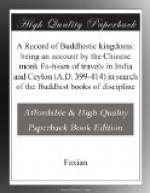CHAPTER XIV
Death of hwuy-king in the little snowy mountains. Lo-E. POHNA. Crossing the Indus to the east.
Having stayed there till the third month of winter, Fa-hien and the two others,(1) proceeding southwards, crossed the Little Snowy mountains.(2) On them the snow lies accumulated both winter and summer. On the north (side) of the mountains, in the shade, they suddenly encountered a cold wind which made them shiver and become unable to speak. Hwuy-king could not go any farther. A white froth came from his mouth, and he said to Fa-hien, “I cannot live any longer. Do you immediately go away, that we do not all die here;” and with these words he died.(3) Fa-hien stroked the corpse, and cried out piteously, “Our original plan has failed;—it is fate.(4) What can we do?” He then again exerted himself, and they succeeded in crossing to the south of the range, and arrived in the kingdom of Lo-e,(5) where there were nearly three thousand monks, students of both the mahayana and hinayana. Here they stayed for the summer retreat,(6) and when that was over, they went on to the south, and ten days’ journey brought them to the kingdom of Poh-na,(7) where there are also more than three thousand monks, all students of the hinayana. Proceeding from this place for three days, they again crossed the Indus, where the country on each side was low and level.(8)
Notes
(1) These must have been Tao-ching and Hwuy-king.
(2) Probably the Safeid Koh, and on the way to the Kohat pass.
(3) All the texts have Kwuy-king. See chapter xii, note 13.
(4) A very natural exclamation, but out of place and inconsistent from the lips of Fa-hien. The Chinese character {.}, which he employed, may be rendered rightly by “fate” or “destiny;” but the fate is not unintelligent. The term implies a factor, or fa-tor, and supposes the ordination of Heaven or God. A Confucian idea for the moment overcame his Buddhism.
(5) Lo-e, or Rohi, is a name for
Afghanistan; but only a portion of it
can be here intended.




